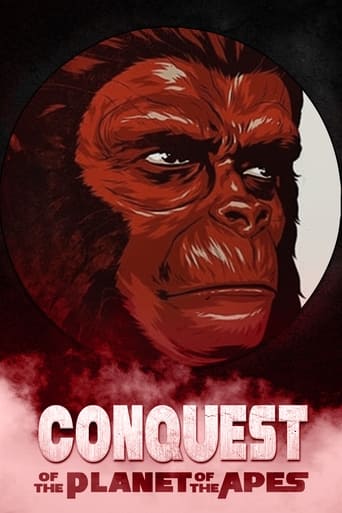Anssi Vartiainen
The problem with these Planet of the Apes sequels seems to be that they get too ambitious or hasty with their stories. In the third film it worked because of great actors and because it actually flowed well with the original film. In this case the story flows well with the original, but not at all with the previous two.What do I mean by that? Well, the events of the second film paved the way for the third film which was supposed to work as a prequel to the original, in its own way. And thus this film is trying to bridge the gap between the third and the original. Explain how the planet of the apes came to be. The only problem is that it insists on using the characters from the third film, and that simply doesn't work timeline-wise. The world has changed a lot between the two movies and not in a realistic manner. It like a magician snapped his fingers and suddenly the world was abruptly changed in the blink of an eye.Not helping the matters is that the film doesn't quite have the scope, the talent or the budget to pull of the story it wants to tell. It has a big climax, but you don't buy it as well as you should.Still, the characters are nice, especially Caesar, played by Roddy McDowall, who also played Caesar's father Cornelius in two of the previous films. It's shame that they couldn't work Kim Hunter back in some way, but McDowall is nice as well.Still, if you've liked the films so far, I don't think you should stop at this point. It's nowhere near as good as the original, or even the third one, but it's worth watching in order to get the full experience.
joshuadrake-91275
Based on the strong positive response to Escape from the Planet of the Apes, Fox ordered Conquest of the Planet of the Apes, though it provided a comparatively low budget of $1.7 million. Paul Dehn returned as the scriptwriters and the producers hired J. Lee Thompson to direct.Thompson had worked with Jacobs during the planning stages of the first film, but scheduling conflicts had made him unavailable to participate in the series. For this film, Thompson and Dehn focused heavily on the racial associated the apes with African-Americans and modeled the plot after the 1966 Watts Riots and other episodes from the Civil Rights Movement.Following the events of the third film, this film is set in a near future where humans have turned apes into slaves, Caesar rises from bondage to lead an ape rebellion.The story is amazing and confusing as well, but I like it because it is like that. The action is over-the-top, but it works and is really fantastic. The music is really good as well and the other films musical scores' were amazing, well, with exception of "Beneath the Planet of the Apes".The acting is just amazing and dreadful at the same time. Roddy McDowall plays Caesar again, the son of his previous character Cornelieus.The late Ricardo Montalban returned as Armando and he does a good job as well. The new members including Don Murray, Severn Darden and Hari Rhodes playing new roles and they are really amazing in this film and the acting could have never been better.The music in the film is just stupid, but a few themes are amazingly well done and the make-up / visuals are really good and fantastic.Overall, CONQUEST OF THE PLANET of the APES is a little confusing, but spectacular in a few areas and I give this film a 6/10.
tieman64
In 1961, writer Rod Sterling was asked "what he'd most like to write about next?" He responded: "I'd like to do a definitive study of segregation, from the Negro's point of view." Several years later Sterling would write "Planet of the Apes", soon turned into a 1968 film by Franklin Schaffner. A giant "what if the shoe were on the other foot?" parable, the film finds a chauvinistic American astronaut (Charlton Heston) stranded on a planet ruled by apes. Here he's forced to experience racial discrimination of a type once reserved for blacks.Much of "Planet of the Apes" consisted of a hierarchical society of monkeys, apes and gorillas enslaving and persecuting white humans, actions which they justify along bio-genetic lines. Ironically, though it was intended to show support for African Americans, "Planet" came under attack from activists and black leaders. The film, some argued, re-inscribed racial conflict as species conflict (black/monkey vs white/human), and hinged on physical difference as the point of struggle. The film also played into issues of skin-colour hierarchy, making lighter apes more intelligent than their darker, more uncivilised counterparts. Others would argue that the film endorsed various racist "interpretations" of biological evolution; the belief that Africans are "closer to animal than man", and that primates occupy the border zones between mythic poles. In this view, apes and Africans are liminal creatures, simultaneously like and unlike human beings, located between nature and civilisation, origin and destination. These contradictions have led to the film being labelled either well-meaning or reactionary, pandering to white fears of black uprisings and loss of racial dominance. This, after all, was a period of time in which some believed that black liberation struggles would threaten the security of white racial hegemony.Regardless, Charlton Heston is fittingly cast as our "white hero". Heston made a career starring in epics in which Western and non-Western interests collide. In "Gunfighter Nation: The myth of the frontier in 20th century America", for example, cultural historian Richard Slotkin states that the typical Heston character was a "hard and self-willed White male hero", an ultra conservative "who stands for the highest values of civilisation and progress but who is typically besieged from without by non-white savages who greatly outnumber him and beset from within by the decadence, corruption and softness of his own society". Indeed, in the sixties Heston seemed to be perpetually fighting to defend an outpost on the margins of Western civilisation from barbaric onslaughts (The Naked Jungle, El City, 55 Days at Peking, Khartoum etc)."Planet of the Apes" was brilliantly directed by Franklin J. Schaffner, who treats us to some wonderful widescreen photography and a couple fine action sequences. Its sequel was "Beneath the Planet of the Apes", directed by Ted Post. Filled with apocalyptic imagery (lots of radiation, nuclear war, disease), the film portrayed its society of apes, the winners in a war between monkey and man, as having become as classist, racist, warmongering and destructive as white humans. Rod Sterling's metaphors are henceforth complicated; both the white man and ape at different points of the franchise's time-line represent both white hegemony and persecuted blacks. Apes, we then learn, were once slaves to humans, just as humans are now slaves to apes. The first two films in the franchise also hinge on a big secret: the ape society is covering up the fact that human civilisation existed before ape civilisations and that apes are "descended" from humans. The implication, depending how literally you regard the film's dubious ape/minority metaphors and reversals, is that whites shamefully regard themselves as having "evolved" from blacks.The next film in the franchise, "Escape from the Planet of the Apes" sees a group of intellectual apes travelling back in time. They arrive on Earth, where they are abused by a paranoid military industrial complex which kills them all, except for one ape child, Caesar.J. Lee Thompson's "Conquest of the Planet of the Apes" followed. The best sequel in the franchise, the film sees a now adult Caesar leading a revolution (based on the Watts race riots) against a humanity which is attempting to turn apes into slaves. Significantly, Caesar's army of apes learns to talk. Their first word is "no", a command which refers to the apes' abhorrence of weapons and violence. Next came "Battle for the Planet of the Apes", again directed by Thompson. Here, within a post-nuclear society, an ageing Caesar struggles to combat ape factions which want to wipe out all of humanity. Caesar, in contrast, fights for peaceful coexistence. Caesar wins, leading to a long period of peace between man and monkey.So each ape film film is built around the conflict between a racially dominant oppressive group and a racially subordinate oppressed group seeking survival, harmony or reversal of domination. Each film also presents mediating figures – typically marginalised and at odds with the oppressing group - who intervene in the conflict, challenge systems and act as advocates of harmony. The advocates of peace rarely prevail and hostility always results in apocalyptic violence.The ape franchise would be rebooted in 2011 with "Rise of the Planet of the Apes". A post-racial film, "Rise's" cast is filled with a cocktail of African Americans, whites and Indo-Americans. For the first time in the franchise, metaphor is replaced by literalism. Here, "literal apes" are "literally rebelling" against the "literal animal cruelty" (chemical testing) directed against them by "literal scientists". Typically (mis?)read in light of post-financial crisis protests, the film ends with apes, led by Caesar, escaping their cages for the trees of local forests. Here, segregation is "in everyone's best interest" and Caesar concludes that separation is "natural". The apes, now free, have returned to their correct, natural and separate place. For now.8/10 - Worth two viewings.
Ajtlawyer
The fourth of the series, "Conquest of the Planet of the Apes" is the 2nd best of the entire run, after the original entry. It is also the basis for the recent re-boot "Rise of the Planet of the Apes". I saw this movie in the theater when I was a kid and the ending scared the wits out of me.The movie had a very small budget but more than made up for it with the very solid writing and some excellent acting by the principal cast, Roddy McDowell, Don Murray, Ricardo Montalban, Severn Darden and Hari Rhodes.Montalban sets up the story very well as Armando, the kindly circus master who has hidden the intelligent ape, Caesar, for a couple of decades. But when Caesar blurts out his anger at the humans who are mistreating an ape, he has to go into hiding while Montalban tries to cover for him, at the cost of his life. The "speciest" gov't is now determined to find the intelligent ape that they feel certain now exists. Caesar goes "native" by becoming a mute simian servant of the humans but fomenting revolution all the while behind the scenes.Hari Rhodes' character is particularly interesting. An aide to the bigoted governor played by Don Murray, as a black man and descendant of slaves his heart is more with the apes than it is with his own people. He provides Caesar some crucial support at key moments in the show and then has to make an appeal to the ape's "humanity" at the end when the apes are about to massacre their human prisoners. But as Caesar points out, he's not a human and simian ideas of justice may not jibe with human concepts.The "Ape" movies were well-known for their downbeat endings. Now nearly every story you see, no matter how grim, has to have some sort of hopeful ending but not the "Ape" series. In episode 1 Taylor discovers that he's on Earth all along in one of the most stunning endings in movie history; in part 2 the world is utterly destroyed in a final war between the humans and apes; part 3 has Caesar's parents being murdered; part 4 the apes have overthrown the human race. Only in part 5 do we finally have a "happy" ending of centuries in the future when men and apes have finally learned to live in peace.





